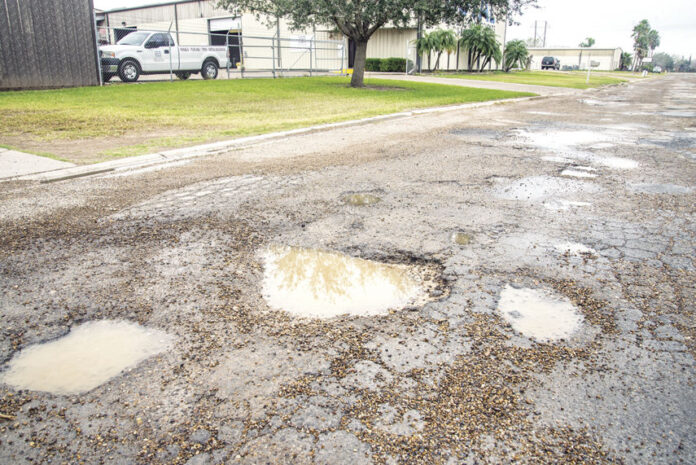HARLINGEN — The city’s utility customers will be footing the bill to help fund street projects.
Last night, city commissioners unanimously voted to approve an ordinance charging a monthly street maintenance fee effective June 1.
The fee will replace the city’s so-called infrastructure fee currently charging utility customers $1 a month to help fund projects such as public building improvements.
Under the new ordinance, utility bills will include a monthly $2.50 fee for apartments and other multi-family units; a $2.50 monthly fee for single-family homes using 1,000 gallons of water a month or less; a $4.50 monthly fee for single-family homes using more than 1,000 gallons a month; and an $8.50 monthly fee for commercial accounts.
The fee will raise about $1.4 million a year to help fund street projects.
The new ordinance creates a five-year program identifying streets for improvements.
When it originally was proposed in January, Commissioners Victor Leal, Michael Mezmar and Ruben de la Rosa voted against a proposal that would have charged monthly $4.50 fees to single-family homes and monthly $8.50 fees to commercial accounts to raise about $1.2 million a year.
At the time, Leal said the proposal needed tweaking while de la Rosa argued fees were too high for many low-income residents. Mezmar declined comment.
But last night, de la Rosa said the revised fee schedule charged lower monthly fees to homes using 1,000 gallons of water or less.
“Obviously, we don’t have enough money currently to pave streets like we need to,” Mezmar told commissioners before a small audience.
City Manager Dan Serna said the new ordinance requires the city to use the fee revenue to fund street projects.
“Dedicating a fee would provide some certainty for that revenue flow,” Mayor Chris Boswell said.
Serna said a property tax rate increase would not earmark revenues to fund street projects.
“That’s an unrestricted fund,” Serna said of revenue raised through a tax increase. “(City departments) will be vying for it. It doesn’t take long to change priorities through discussions.”
Commissioner Tudor Uhlhorn said taxpayers end up footing the bill for street projects.
“It’s not magic. It has to come from somebody,” Uhlhorn said. “Any way you do it, the citizens are going to have to come up with money.”
Street improvements help boost a city’s “economic development,” Uhlhorn said.
“There’s a certain amount of image,” he said. “If you want to be a successful and progressive community, you need streets done.”
In Texas, cities charging residential and commercial fees to fund street improvements include Austin, Corpus Christi, Kingsville, Richmond, Lampasas, College Station, Taylor, Bryan and Lumberton.
Some cities’ fees range from $5 to $12 a month for single-family homes and $5 to $250 a month for commercial accounts, Assistant City Manager Carlos Sanchez said.
Serna said Community Development Block Grant money and the city’s $42 million general fund also could help fund street projects.
“We stretch dollars as much as we can,” Serna said.
Serna put the cost of paving a one-mile stretch of road at $467,000.
Every year, he said, the city improves 2.5 to 3 miles of the 260 total miles of streets within the city.
Streets’ lifespans range from six to 12 years, Sanchez said.
“Every street has different amounts of usage so they all have different lifecycles,” Boswell said.
Boswell has countered some residents’ argument that commissioners should dip into the city’s $15 million cash reserve fund to pay for street projects.
But he’s against using the city’s fund balance to pay for street projects, which he has called “recurring expenses,” and “one-time capital expenditures.”
Boswell has also said the city’s substantial cash reserve helped it upgrade its bond rating, or credit score.
Some residents believe the city should fund street projects instead of building the $14.8 million convention center.
But Boswell has said the convention center will not be funded through the general fund, which funds street projects
Instead, the Harlingen Community Improvement Board, which voters approved in 2017, raises sales tax revenue for so-called “quality of life” projects such as the convention center, Boswell has said.
However, the city plans to use $1.96 million in property tax revenue generated through Harlingen’s three tax increment financing reinvestment zones to pay most of the cost of the eight acres on which the convention center will stand.
The Community Improvement Board, which generates a one-eighth cent sales tax to fund quality-of-life projects, will fund the remaining $800,000 of the land purchase.




